UNIT 9 HUMAN BIOLOGY Part 5 WRITING WORKSHOP, VIEWING WORKSHOP & READING CLUB分层练习(含解析)
文档属性
| 名称 | UNIT 9 HUMAN BIOLOGY Part 5 WRITING WORKSHOP, VIEWING WORKSHOP & READING CLUB分层练习(含解析) | 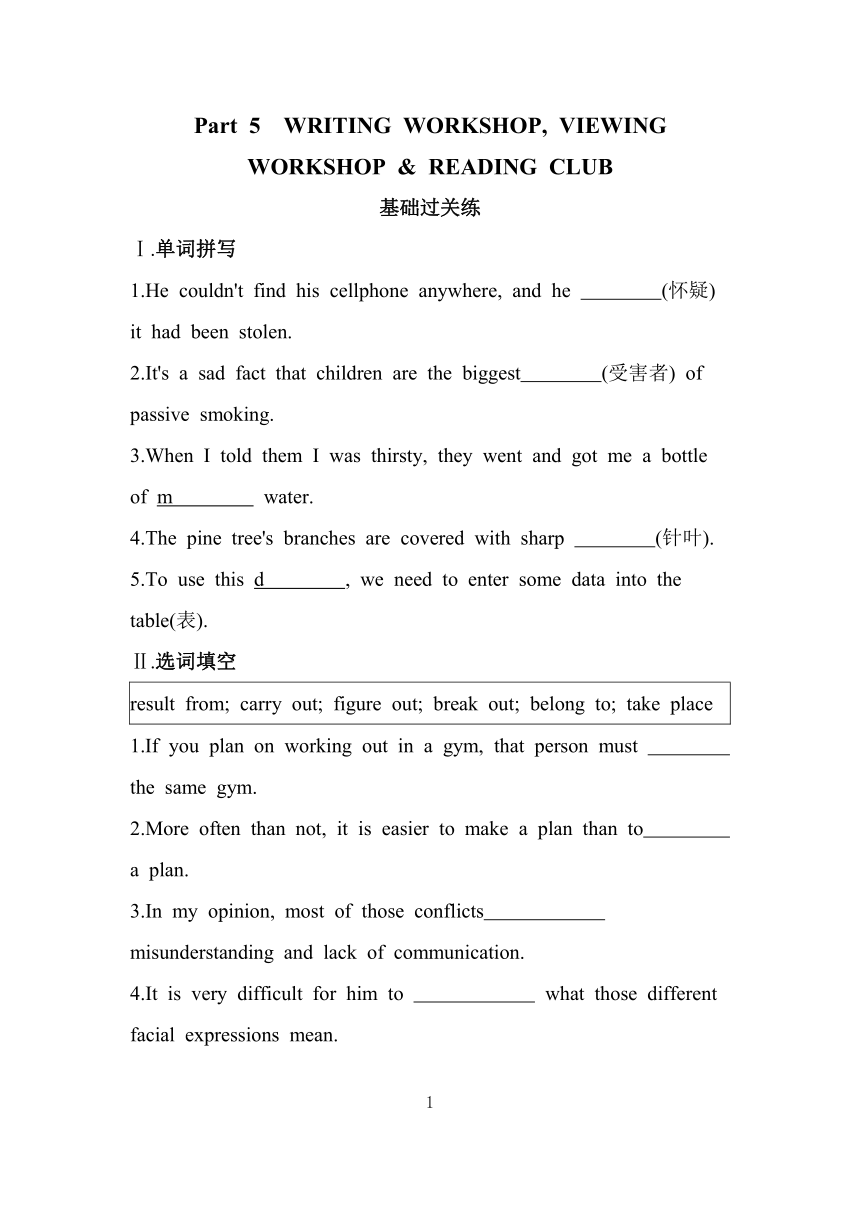 | |
| 格式 | docx | ||
| 文件大小 | 44.8KB | ||
| 资源类型 | 试卷 | ||
| 版本资源 | 北师大版(2019) | ||
| 科目 | 英语 | ||
| 更新时间 | 2025-10-28 18:05:27 | ||
图片预览

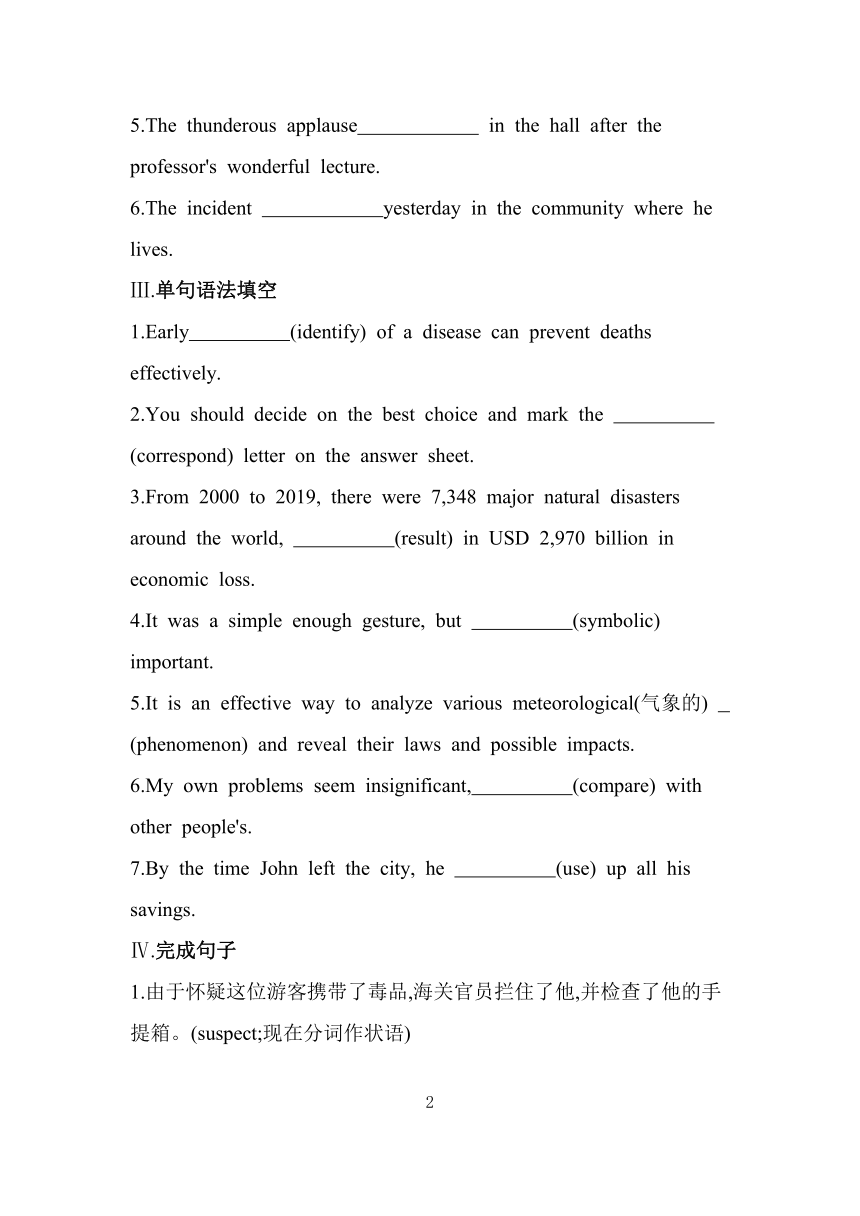
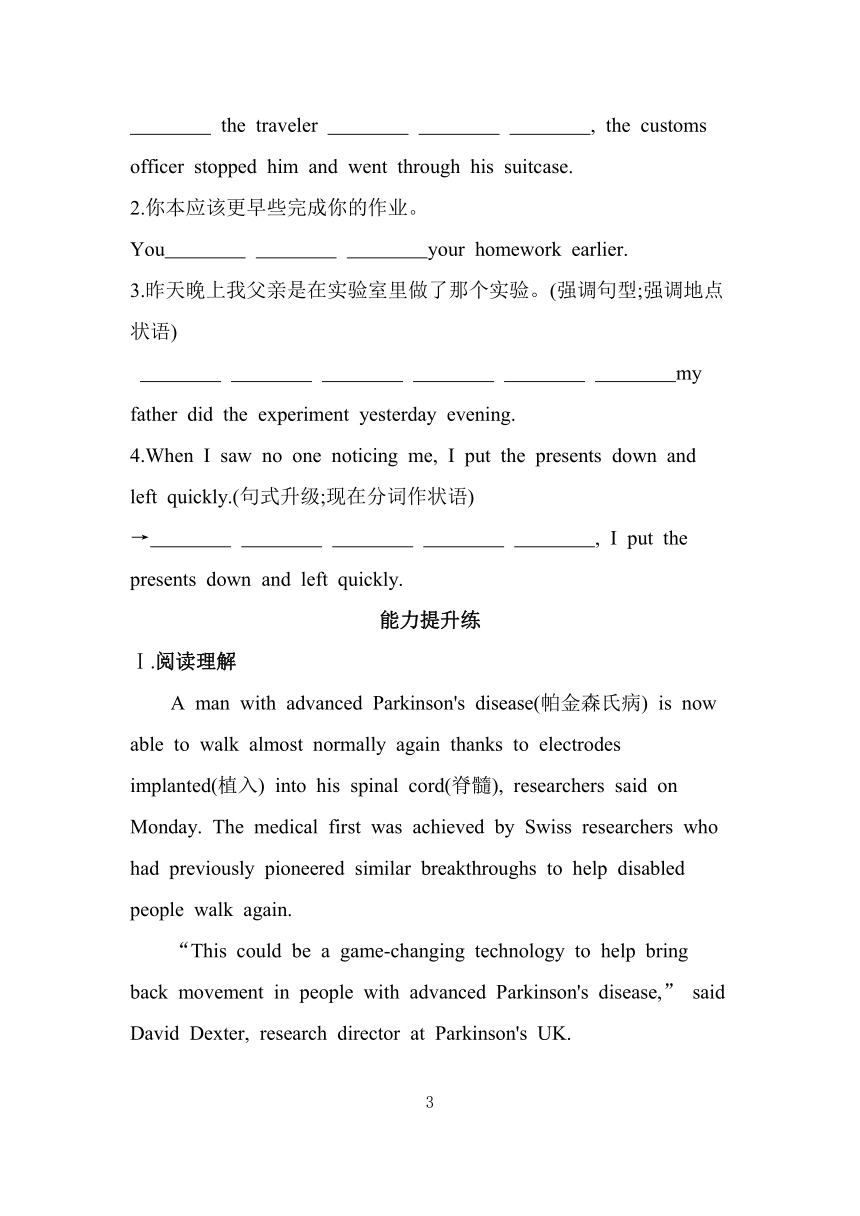
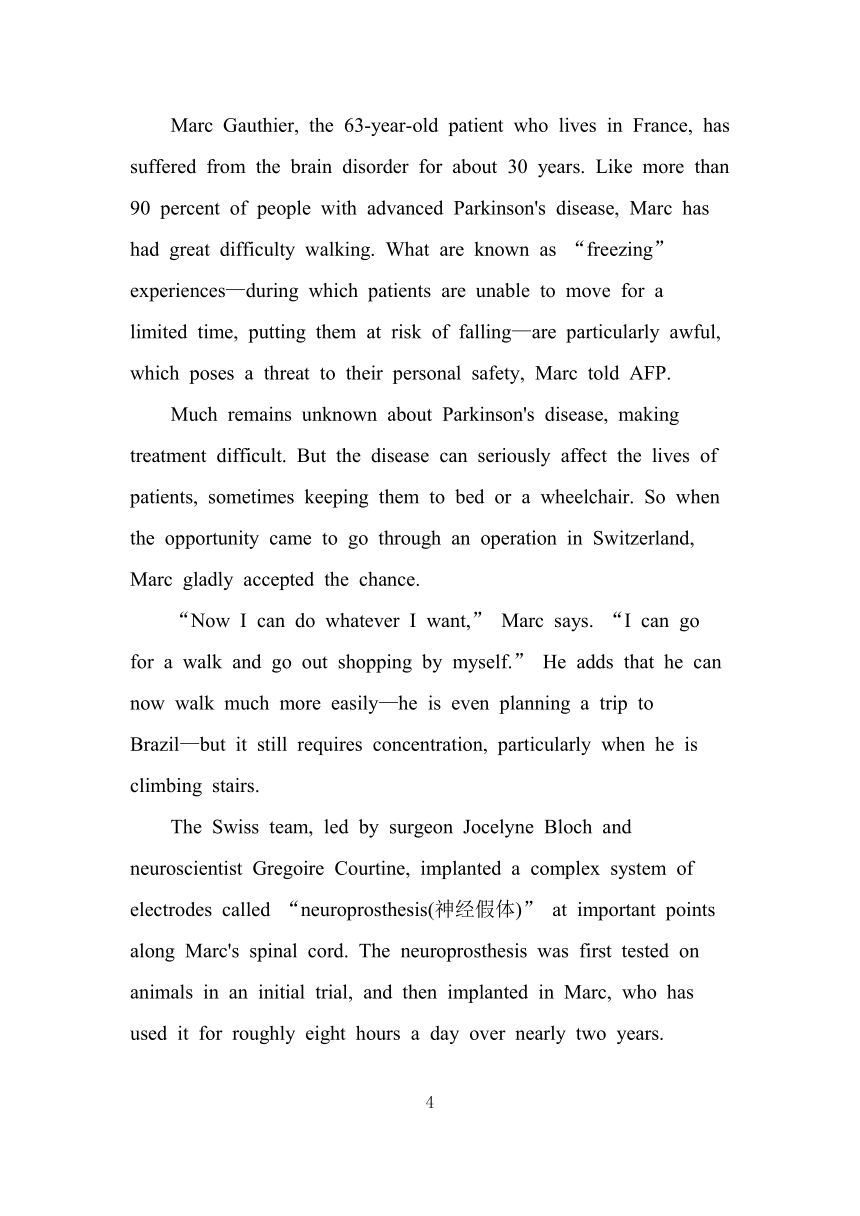
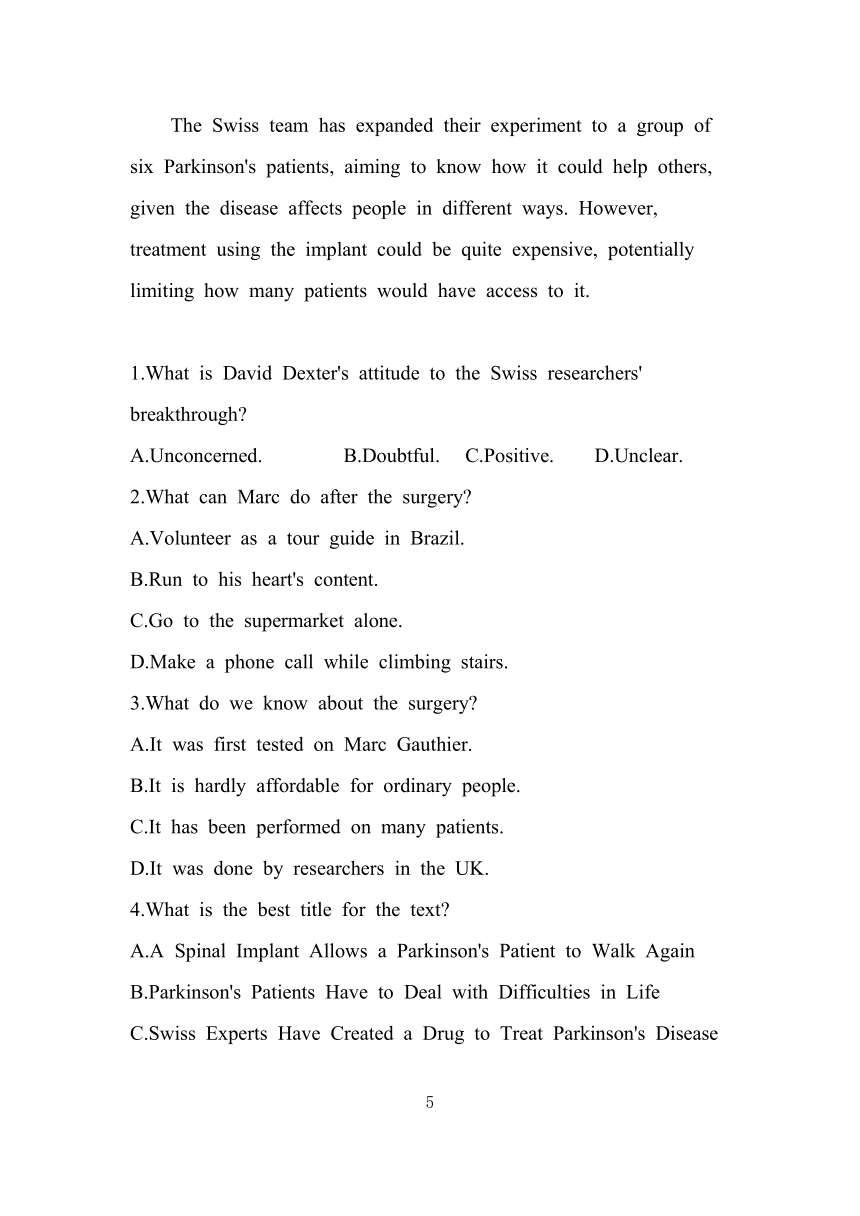
文档简介
Part 5 WRITING WORKSHOP, VIEWING WORKSHOP & READING CLUB
基础过关练
Ⅰ.单词拼写
1.He couldn't find his cellphone anywhere, and he (怀疑) it had been stolen.
2.It's a sad fact that children are the biggest (受害者) of passive smoking.
3.When I told them I was thirsty, they went and got me a bottle of m water.
4.The pine tree's branches are covered with sharp (针叶).
5.To use this d , we need to enter some data into the table(表).
Ⅱ.选词填空
result from; carry out; figure out; break out; belong to; take place
1.If you plan on working out in a gym, that person must the same gym.
2.More often than not, it is easier to make a plan than to a plan.
3.In my opinion, most of those conflicts misunderstanding and lack of communication.
4.It is very difficult for him to what those different facial expressions mean.
5.The thunderous applause in the hall after the professor's wonderful lecture.
6.The incident yesterday in the community where he lives.
Ⅲ.单句语法填空
1.Early (identify) of a disease can prevent deaths effectively.
2.You should decide on the best choice and mark the (correspond) letter on the answer sheet.
3.From 2000 to 2019, there were 7,348 major natural disasters around the world, (result) in USD 2,970 billion in economic loss.
4.It was a simple enough gesture, but (symbolic) important.
5.It is an effective way to analyze various meteorological(气象的) (phenomenon) and reveal their laws and possible impacts.
6.My own problems seem insignificant, (compare) with other people's.
7.By the time John left the city, he (use) up all his savings.
Ⅳ.完成句子
1.由于怀疑这位游客携带了毒品,海关官员拦住了他,并检查了他的手提箱。(suspect;现在分词作状语)
the traveler , the customs officer stopped him and went through his suitcase.
2.你本应该更早些完成你的作业。
You your homework earlier.
3.昨天晚上我父亲是在实验室里做了那个实验。(强调句型;强调地点状语)
my father did the experiment yesterday evening.
4.When I saw no one noticing me, I put the presents down and left quickly.(句式升级;现在分词作状语)
→ , I put the presents down and left quickly.
能力提升练
Ⅰ.阅读理解
A man with advanced Parkinson's disease(帕金森氏病) is now able to walk almost normally again thanks to electrodes implanted(植入) into his spinal cord(脊髓), researchers said on Monday. The medical first was achieved by Swiss researchers who had previously pioneered similar breakthroughs to help disabled people walk again.
“This could be a game-changing technology to help bring back movement in people with advanced Parkinson's disease,” said David Dexter, research director at Parkinson's UK.
Marc Gauthier, the 63-year-old patient who lives in France, has suffered from the brain disorder for about 30 years. Like more than 90 percent of people with advanced Parkinson's disease, Marc has had great difficulty walking. What are known as “freezing” experiences—during which patients are unable to move for a limited time, putting them at risk of falling—are particularly awful, which poses a threat to their personal safety, Marc told AFP.
Much remains unknown about Parkinson's disease, making treatment difficult. But the disease can seriously affect the lives of patients, sometimes keeping them to bed or a wheelchair. So when the opportunity came to go through an operation in Switzerland, Marc gladly accepted the chance.
“Now I can do whatever I want,” Marc says. “I can go for a walk and go out shopping by myself.” He adds that he can now walk much more easily—he is even planning a trip to Brazil—but it still requires concentration, particularly when he is climbing stairs.
The Swiss team, led by surgeon Jocelyne Bloch and neuroscientist Gregoire Courtine, implanted a complex system of electrodes called “neuroprosthesis(神经假体)” at important points along Marc's spinal cord. The neuroprosthesis was first tested on animals in an initial trial, and then implanted in Marc, who has used it for roughly eight hours a day over nearly two years.
The Swiss team has expanded their experiment to a group of six Parkinson's patients, aiming to know how it could help others, given the disease affects people in different ways. However, treatment using the implant could be quite expensive, potentially limiting how many patients would have access to it.
1.What is David Dexter's attitude to the Swiss researchers' breakthrough
A.Unconcerned. B.Doubtful. C.Positive. D.Unclear.
2.What can Marc do after the surgery
A.Volunteer as a tour guide in Brazil.
B.Run to his heart's content.
C.Go to the supermarket alone.
D.Make a phone call while climbing stairs.
3.What do we know about the surgery
A.It was first tested on Marc Gauthier.
B.It is hardly affordable for ordinary people.
C.It has been performed on many patients.
D.It was done by researchers in the UK.
4.What is the best title for the text
A.A Spinal Implant Allows a Parkinson's Patient to Walk Again
B.Parkinson's Patients Have to Deal with Difficulties in Life
C.Swiss Experts Have Created a Drug to Treat Parkinson's Disease
D.New Technology Prevents People from Developing Parkinson's Disease
Ⅱ.读后续写
阅读下面材料,根据其内容和所给段落开头语续写两段,使之构成一篇完整的短文。
My mother used to ask me what the most important part of the body was. Through the years I would take a guess at what I thought was the correct answer. When I was younger, I thought the sound was very important to us humans, so I said, “My ears, Mommy.”
She said, “No. Many people are deaf. But they are doing well in their life. You keep thinking about it and I will ask you again soon.” Several years passed before she asked me again. Since making my first attempt, I had contemplated the correct answer. So this time I told her, “Mommy, sight is very important to everybody, so it must be our eyes.”
She looked at me and told me, “You are learning fast, but the answer is not correct because there are many people who are blind.”
Over the years my mother asked me a couple more times and always her answer was, “No, but you are getting smarter every year, my child.”
Then last year, my grandpa died. Everybody was hurt. Everybody was crying. My mom looked at me when it was our turn to say our final goodbye to Grandpa. She asked me, “Do you know the most important body part yet, my dear ”
I was surprised when she asked me this on this occasion. I always thought this was a game between her and me. She saw the confusion on my face and told me, “This question is very important. How you answer it shows whether you have learned about life. For every body part you gave me in the past, I have told you that you were wrong and I have given you a reason. But today is the day you will know the answer.”
I looked puzzled.
“All your previous answers—ears, eyes, hands, the heart...are very important to yourself. But this time I need you to think of something that is important to others.”
注意:续写词数应为150个左右。
“My dear, the most important body part,” she said, “is your shoulder.”
“Mom, I understand. And you can cry on my shoulder too.”
Part 5 WRITING WORKSHOP, VIEWING
WORKSHOP & READING CLUB
基础过关练
Ⅰ.1.suspected 2.victims 3.mineral 4.needles
5.database
Ⅱ.1.belong to 2.carry out 3.result from 4.figure out
5.broke out 6.took place
Ⅲ.1.identification 考查名词。句意:疾病的早期确认可以有效地避免死亡。分析句子可知设空处作主语,由空前的形容词Early和空后的介词of可知此处应用名词,故填identification。
2.corresponding 考查形容词。句意:你应该选出最佳答案,并在答题卡上标出对应的字母。根据空前的定冠词the和空后的名词letter可知设空处应用形容词作定语,故填corresponding。
3.resulting 考查现在分词。句意:从2000年至2019年,全球共发生重大自然灾害7,348起,造成经济损失2.97万亿美元。7,348 major natural disasters与result in是逻辑上的主动关系,且此处表示一种自然而然的结果,应用现在分词作结果状语。故填resulting。
4.symbolically 考查副词。句意:这虽是个再简单不过的手势,却有着重要的象征意义。设空处修饰形容词important,所以应用副词,故填symbolically。
5.phenomena 考查名词复数。句意:它是分析各种气象现象,揭示其规律和可能产生的影响的有效途径。phenomenon(现象)为可数名词,其复数形式为phenomena,由前面的various可知,这里应该用复数形式,故填phenomena。
6.compared 考查过去分词。句意:与别人的问题相比,我自己的问题似乎微不足道。分析句子可知设空处作状语,compared with...意为“与……相比”,故填compared。
7.had used 考查时态。句意:到约翰离开这个城市时,他已经花光了所有的积蓄。由语境可知,use up这个动作发生在left之前,此处表示“过去的过去”,应用过去完成时,故填had used。
Ⅳ.1.Suspecting; of carrying drugs 2.should have finished
3.It was in the lab that 4.Seeing no one noticing me
能力提升练
Ⅰ.◎语篇解读 本文是一篇新闻报道。文章主要报道了一名患有晚期帕金森氏病的男子在脊髓中植入了电极后几乎能够正常行走。
1.C 推理判断题。根据第二段中的“This could be a game-changing technology to help bring back movement in people with advanced Parkinson's disease(这可能是一项具有变革性的技术,可以帮助晚期帕金森氏病患者恢复运动)”可推知,David Dexter对瑞士研究人员的突破持积极态度。故选C。
2.C 细节理解题。根据第五段中的“I can go for a walk and go out shopping by myself.”可知,Marc在手术后能够独自去散步和外出购物。故选C。
3.B 细节理解题。根据最后一段最后一句“However, treatment using the implant could be quite expensive, potentially limiting how many patients would have access to it.(然而,使用植入物的治疗方法可能相当昂贵,有可能限制有机会获得治疗的患者的数量。)”可知,这种治疗方法非常昂贵,普通人很难负担得起这项手术。故选B。
4.A 主旨大意题。通读全文,尤其是第一段“研究人员周一表示,一名患有晚期帕金森氏病的男子现在几乎可以正常行走了,这多亏了在他的脊髓中植入了电极。瑞士研究人员在医学上率先实现了这一突破,此前他们曾在帮助残疾人再次行走方面取得了类似的突破。”可知,本文主要讲的是在脊髓中植入电极使帕金森氏病患者能够再次行走。A选项“A Spinal Implant Allows a Parkinson's Patient to Walk Again(一种脊髓植入物让帕金森氏病患者再次行走)”能够概括文章主旨,最适合作为文章标题。故选A。
【高频词汇】 1.thanks to 幸亏,由于,因为
2.breakthrough n.突破 3.suffer from因……受苦/受折磨
4.require v.需要 5.access n.(使用或见到的)机会,权利
【熟词生义】 first n.空前的成就
【差距词汇】 roughly adv.大约,大致,差不多
长难句
原句 What are known as “freezing” experiences—during which patients are unable to move for a limited time, putting them at risk of falling—are particularly awful, which poses a threat to their personal safety, Marc told AFP.
分析 本句是主从复合句。What are known as “freezing” experiences are particularly awful是主句,其中What引导主语从句;during which引导定语从句,修饰先行词“freezing” experiences;which引导非限制性定语从句。
译文 马克告诉法新社,所谓的“冻结”经历——在此期间,患者在有限的时间内无法移动,这使他们有摔倒的危险——特别可怕,这对他们的个人安全构成威胁。
Ⅱ.
写作指导
情节线 情感线
时间 “我”小时候,去年 好奇 伤心 惊讶 困惑 理解 感悟
人物 “我”,“我”的妈妈
背景 “我”的妈妈经常问“我”身体最重要的部位是什么,但每次“我”回答后妈妈都说“我”的答案不对。
开端 去年,“我”的外公去世了。每个人都很难过。
发展 妈妈在外公的葬礼上问“我”身体最重要的部位是什么。“我”很吃惊妈妈在这个场合问“我”这个问题,但妈妈说这很重要。
Para. 1 她说:“亲爱的,身体最重要的部位是你的肩膀。”(段首句)
①听到妈妈的答案,“我”有什么反应 ②妈妈是如何解释的
Para. 2 “妈妈,我明白了。你也可以靠在我的肩膀上哭。”(段首句)
①听了妈妈的解释“我”是怎么做的 ②“我”的妈妈是怎么做的 ③“我”有什么样的感受
One possible version:
“My dear, the most important body part,” she said, “is your shoulder.” “Is it because it holds my head ” I asked. “No, it is because it can hold the head of a friend or loved one when they cry,” she replied. “Everybody needs a shoulder to cry on sometime in life, my dear. I only hope that you have enough love and friends, so that you will always have a shoulder to cry on when you need it.” I saw tears welling up in her eyes.
“Mom, I understand. And you can cry on my shoulder too.” And silently, my mother put her head on my shoulder and started to cry. It was not heavy at all, and the wetness didn't make me uncomfortable either. In fact when her warm tears damped my shoulder, I felt the pain in her heart, and I knew how hurt and lonely she was at that moment. I felt I was important. I felt like a man. I was there when someone I loved dearly needed me.
6
基础过关练
Ⅰ.单词拼写
1.He couldn't find his cellphone anywhere, and he (怀疑) it had been stolen.
2.It's a sad fact that children are the biggest (受害者) of passive smoking.
3.When I told them I was thirsty, they went and got me a bottle of m water.
4.The pine tree's branches are covered with sharp (针叶).
5.To use this d , we need to enter some data into the table(表).
Ⅱ.选词填空
result from; carry out; figure out; break out; belong to; take place
1.If you plan on working out in a gym, that person must the same gym.
2.More often than not, it is easier to make a plan than to a plan.
3.In my opinion, most of those conflicts misunderstanding and lack of communication.
4.It is very difficult for him to what those different facial expressions mean.
5.The thunderous applause in the hall after the professor's wonderful lecture.
6.The incident yesterday in the community where he lives.
Ⅲ.单句语法填空
1.Early (identify) of a disease can prevent deaths effectively.
2.You should decide on the best choice and mark the (correspond) letter on the answer sheet.
3.From 2000 to 2019, there were 7,348 major natural disasters around the world, (result) in USD 2,970 billion in economic loss.
4.It was a simple enough gesture, but (symbolic) important.
5.It is an effective way to analyze various meteorological(气象的) (phenomenon) and reveal their laws and possible impacts.
6.My own problems seem insignificant, (compare) with other people's.
7.By the time John left the city, he (use) up all his savings.
Ⅳ.完成句子
1.由于怀疑这位游客携带了毒品,海关官员拦住了他,并检查了他的手提箱。(suspect;现在分词作状语)
the traveler , the customs officer stopped him and went through his suitcase.
2.你本应该更早些完成你的作业。
You your homework earlier.
3.昨天晚上我父亲是在实验室里做了那个实验。(强调句型;强调地点状语)
my father did the experiment yesterday evening.
4.When I saw no one noticing me, I put the presents down and left quickly.(句式升级;现在分词作状语)
→ , I put the presents down and left quickly.
能力提升练
Ⅰ.阅读理解
A man with advanced Parkinson's disease(帕金森氏病) is now able to walk almost normally again thanks to electrodes implanted(植入) into his spinal cord(脊髓), researchers said on Monday. The medical first was achieved by Swiss researchers who had previously pioneered similar breakthroughs to help disabled people walk again.
“This could be a game-changing technology to help bring back movement in people with advanced Parkinson's disease,” said David Dexter, research director at Parkinson's UK.
Marc Gauthier, the 63-year-old patient who lives in France, has suffered from the brain disorder for about 30 years. Like more than 90 percent of people with advanced Parkinson's disease, Marc has had great difficulty walking. What are known as “freezing” experiences—during which patients are unable to move for a limited time, putting them at risk of falling—are particularly awful, which poses a threat to their personal safety, Marc told AFP.
Much remains unknown about Parkinson's disease, making treatment difficult. But the disease can seriously affect the lives of patients, sometimes keeping them to bed or a wheelchair. So when the opportunity came to go through an operation in Switzerland, Marc gladly accepted the chance.
“Now I can do whatever I want,” Marc says. “I can go for a walk and go out shopping by myself.” He adds that he can now walk much more easily—he is even planning a trip to Brazil—but it still requires concentration, particularly when he is climbing stairs.
The Swiss team, led by surgeon Jocelyne Bloch and neuroscientist Gregoire Courtine, implanted a complex system of electrodes called “neuroprosthesis(神经假体)” at important points along Marc's spinal cord. The neuroprosthesis was first tested on animals in an initial trial, and then implanted in Marc, who has used it for roughly eight hours a day over nearly two years.
The Swiss team has expanded their experiment to a group of six Parkinson's patients, aiming to know how it could help others, given the disease affects people in different ways. However, treatment using the implant could be quite expensive, potentially limiting how many patients would have access to it.
1.What is David Dexter's attitude to the Swiss researchers' breakthrough
A.Unconcerned. B.Doubtful. C.Positive. D.Unclear.
2.What can Marc do after the surgery
A.Volunteer as a tour guide in Brazil.
B.Run to his heart's content.
C.Go to the supermarket alone.
D.Make a phone call while climbing stairs.
3.What do we know about the surgery
A.It was first tested on Marc Gauthier.
B.It is hardly affordable for ordinary people.
C.It has been performed on many patients.
D.It was done by researchers in the UK.
4.What is the best title for the text
A.A Spinal Implant Allows a Parkinson's Patient to Walk Again
B.Parkinson's Patients Have to Deal with Difficulties in Life
C.Swiss Experts Have Created a Drug to Treat Parkinson's Disease
D.New Technology Prevents People from Developing Parkinson's Disease
Ⅱ.读后续写
阅读下面材料,根据其内容和所给段落开头语续写两段,使之构成一篇完整的短文。
My mother used to ask me what the most important part of the body was. Through the years I would take a guess at what I thought was the correct answer. When I was younger, I thought the sound was very important to us humans, so I said, “My ears, Mommy.”
She said, “No. Many people are deaf. But they are doing well in their life. You keep thinking about it and I will ask you again soon.” Several years passed before she asked me again. Since making my first attempt, I had contemplated the correct answer. So this time I told her, “Mommy, sight is very important to everybody, so it must be our eyes.”
She looked at me and told me, “You are learning fast, but the answer is not correct because there are many people who are blind.”
Over the years my mother asked me a couple more times and always her answer was, “No, but you are getting smarter every year, my child.”
Then last year, my grandpa died. Everybody was hurt. Everybody was crying. My mom looked at me when it was our turn to say our final goodbye to Grandpa. She asked me, “Do you know the most important body part yet, my dear ”
I was surprised when she asked me this on this occasion. I always thought this was a game between her and me. She saw the confusion on my face and told me, “This question is very important. How you answer it shows whether you have learned about life. For every body part you gave me in the past, I have told you that you were wrong and I have given you a reason. But today is the day you will know the answer.”
I looked puzzled.
“All your previous answers—ears, eyes, hands, the heart...are very important to yourself. But this time I need you to think of something that is important to others.”
注意:续写词数应为150个左右。
“My dear, the most important body part,” she said, “is your shoulder.”
“Mom, I understand. And you can cry on my shoulder too.”
Part 5 WRITING WORKSHOP, VIEWING
WORKSHOP & READING CLUB
基础过关练
Ⅰ.1.suspected 2.victims 3.mineral 4.needles
5.database
Ⅱ.1.belong to 2.carry out 3.result from 4.figure out
5.broke out 6.took place
Ⅲ.1.identification 考查名词。句意:疾病的早期确认可以有效地避免死亡。分析句子可知设空处作主语,由空前的形容词Early和空后的介词of可知此处应用名词,故填identification。
2.corresponding 考查形容词。句意:你应该选出最佳答案,并在答题卡上标出对应的字母。根据空前的定冠词the和空后的名词letter可知设空处应用形容词作定语,故填corresponding。
3.resulting 考查现在分词。句意:从2000年至2019年,全球共发生重大自然灾害7,348起,造成经济损失2.97万亿美元。7,348 major natural disasters与result in是逻辑上的主动关系,且此处表示一种自然而然的结果,应用现在分词作结果状语。故填resulting。
4.symbolically 考查副词。句意:这虽是个再简单不过的手势,却有着重要的象征意义。设空处修饰形容词important,所以应用副词,故填symbolically。
5.phenomena 考查名词复数。句意:它是分析各种气象现象,揭示其规律和可能产生的影响的有效途径。phenomenon(现象)为可数名词,其复数形式为phenomena,由前面的various可知,这里应该用复数形式,故填phenomena。
6.compared 考查过去分词。句意:与别人的问题相比,我自己的问题似乎微不足道。分析句子可知设空处作状语,compared with...意为“与……相比”,故填compared。
7.had used 考查时态。句意:到约翰离开这个城市时,他已经花光了所有的积蓄。由语境可知,use up这个动作发生在left之前,此处表示“过去的过去”,应用过去完成时,故填had used。
Ⅳ.1.Suspecting; of carrying drugs 2.should have finished
3.It was in the lab that 4.Seeing no one noticing me
能力提升练
Ⅰ.◎语篇解读 本文是一篇新闻报道。文章主要报道了一名患有晚期帕金森氏病的男子在脊髓中植入了电极后几乎能够正常行走。
1.C 推理判断题。根据第二段中的“This could be a game-changing technology to help bring back movement in people with advanced Parkinson's disease(这可能是一项具有变革性的技术,可以帮助晚期帕金森氏病患者恢复运动)”可推知,David Dexter对瑞士研究人员的突破持积极态度。故选C。
2.C 细节理解题。根据第五段中的“I can go for a walk and go out shopping by myself.”可知,Marc在手术后能够独自去散步和外出购物。故选C。
3.B 细节理解题。根据最后一段最后一句“However, treatment using the implant could be quite expensive, potentially limiting how many patients would have access to it.(然而,使用植入物的治疗方法可能相当昂贵,有可能限制有机会获得治疗的患者的数量。)”可知,这种治疗方法非常昂贵,普通人很难负担得起这项手术。故选B。
4.A 主旨大意题。通读全文,尤其是第一段“研究人员周一表示,一名患有晚期帕金森氏病的男子现在几乎可以正常行走了,这多亏了在他的脊髓中植入了电极。瑞士研究人员在医学上率先实现了这一突破,此前他们曾在帮助残疾人再次行走方面取得了类似的突破。”可知,本文主要讲的是在脊髓中植入电极使帕金森氏病患者能够再次行走。A选项“A Spinal Implant Allows a Parkinson's Patient to Walk Again(一种脊髓植入物让帕金森氏病患者再次行走)”能够概括文章主旨,最适合作为文章标题。故选A。
【高频词汇】 1.thanks to 幸亏,由于,因为
2.breakthrough n.突破 3.suffer from因……受苦/受折磨
4.require v.需要 5.access n.(使用或见到的)机会,权利
【熟词生义】 first n.空前的成就
【差距词汇】 roughly adv.大约,大致,差不多
长难句
原句 What are known as “freezing” experiences—during which patients are unable to move for a limited time, putting them at risk of falling—are particularly awful, which poses a threat to their personal safety, Marc told AFP.
分析 本句是主从复合句。What are known as “freezing” experiences are particularly awful是主句,其中What引导主语从句;during which引导定语从句,修饰先行词“freezing” experiences;which引导非限制性定语从句。
译文 马克告诉法新社,所谓的“冻结”经历——在此期间,患者在有限的时间内无法移动,这使他们有摔倒的危险——特别可怕,这对他们的个人安全构成威胁。
Ⅱ.
写作指导
情节线 情感线
时间 “我”小时候,去年 好奇 伤心 惊讶 困惑 理解 感悟
人物 “我”,“我”的妈妈
背景 “我”的妈妈经常问“我”身体最重要的部位是什么,但每次“我”回答后妈妈都说“我”的答案不对。
开端 去年,“我”的外公去世了。每个人都很难过。
发展 妈妈在外公的葬礼上问“我”身体最重要的部位是什么。“我”很吃惊妈妈在这个场合问“我”这个问题,但妈妈说这很重要。
Para. 1 她说:“亲爱的,身体最重要的部位是你的肩膀。”(段首句)
①听到妈妈的答案,“我”有什么反应 ②妈妈是如何解释的
Para. 2 “妈妈,我明白了。你也可以靠在我的肩膀上哭。”(段首句)
①听了妈妈的解释“我”是怎么做的 ②“我”的妈妈是怎么做的 ③“我”有什么样的感受
One possible version:
“My dear, the most important body part,” she said, “is your shoulder.” “Is it because it holds my head ” I asked. “No, it is because it can hold the head of a friend or loved one when they cry,” she replied. “Everybody needs a shoulder to cry on sometime in life, my dear. I only hope that you have enough love and friends, so that you will always have a shoulder to cry on when you need it.” I saw tears welling up in her eyes.
“Mom, I understand. And you can cry on my shoulder too.” And silently, my mother put her head on my shoulder and started to cry. It was not heavy at all, and the wetness didn't make me uncomfortable either. In fact when her warm tears damped my shoulder, I felt the pain in her heart, and I knew how hurt and lonely she was at that moment. I felt I was important. I felt like a man. I was there when someone I loved dearly needed me.
6
